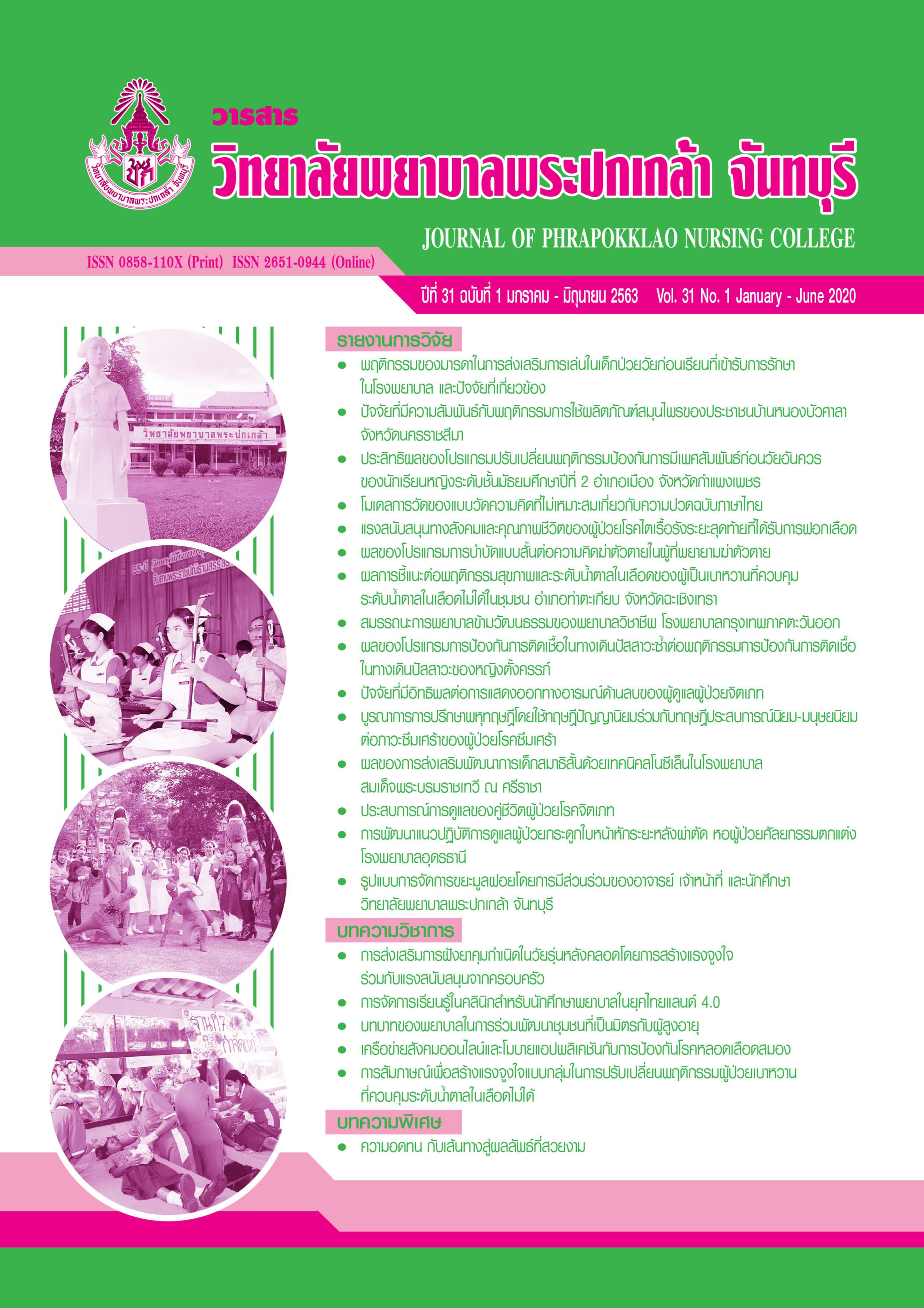Caring Experiences of Spouses of Persons with Schizophrenia
Keywords:
Caring, Spouse caregiver, SchizophreniaAbstract
This qualitative research aimed to explain meaning of caring and caring experiences of spouses of persons with schizophrenia. The informants consisted of 13 spouses of persons with schizophrenia who took the patients for treatment at the out-patient department of one government hospital. The research instruments included the researcher, the demographic interview form, the interview guide regarding caring experiences of spouses of persons with schizophrenia, the field note, the paraphrase and coding record form, and the operational record form. An in-depth interview and observation were performed to collect data from October, 2017 to April, 2018. Data were analyzed by using Colaizzi’s method.
The research results revealed that meaning of caring of spouses of persons with schizophrenia were consisted of 2 major themes: 1) caring is loving and understanding, and 2) bonding family ties cannot be abandoned. Additionally, caring experiences of spouses of persons with schizophrenia were consisted of 3 major themes: 1) knowing and understanding about the disease, 2) adaptation when their spouses got sick, and 3) taking care according to symptoms.
This research suggests that psychistric health care providers should provide counseling for spouses of persons with schizophrenia regarding effective communication, social support seeking, effective time management and problem solving as well as resilience strengthening.
References
กรมสุขภาพจิต. (2557). รายงานประจำปีกรมสุขภาพจิต ปีงบประมาณ 2557. กรุงเทพฯ: บียอนด์ พับลิสชิ่ง.
กาญจนา ลุศนันทน์. (2547). หน้าที่ของครอบครัว. สืบค้นจาก https://pirun.ku.ac.th/~agrpct/lesson4/role2.html
จิราภรณ์ สรรพวีรวงศ์. (2544). ความเครียดและการเผชิญความเครียดของผู้ป่วยจิตเภทในชีวิตประจำวัน กรณีศึกษาโรงพยาบาลสมเด็จเจ้าพระยา. วารสารการพยาบาลจิตเวชและสุขภาพจิต, 15(2), 52-65.
จีรนันท์ ขันแข็ง. (2548). ประสบการณ์ของมารดาในการดูแลบุตรที่ป่วยด้วยโรคจิตเภท (วิทยานิพนธ์ปริญญามหาบัณฑิต). กรุงเทพฯ: จุฬาลงกรณ์มหาวิทยาลัย.
เทียนทอง หาระบุตร. (2555). ปัจจัยคัดสรรที่มีความสัมพันธ์กับพลังสุขภาพจิตของผู้ดูแลผู้ป่วยจิตเภทในชุมชน (วิทยานิพนธ์ปริญญามหาบัณฑิต). กรุงเทพฯ: จุฬาลงกรณ์มหาวิทยาลัย.
ธิดารัตน์ คณึงเพียร. (2556). ประสบการณ์การดูแลผู้ป่วยจิตเภทในชุมชน. วารสารกองการพยาบาล, 40(1), 57-66.
นงพงา ลิ้มสุวรรณ, และสุวรรณี พุทธิศรี. (2545). ความคาดหวังจากชีวิตคู่. วารสารสมาคมจิตแพทย์แห่งประเทศไทย, 47(3), 197-208.
ประยูร สุยะใจ. (2558). การปรับตัวในสถานการณ์วิกฤติของชีวิต. สืบค้นจาก http://www.mcu.ac.th/site/articlecontent_desc.php?article_id=2096&menutype=1&articlegroup_id=330
พรทิพย์ ไขสะอาด. (2555). ผลของโปรแกรมการจัดการความเครียดต่ออาการทางจิตของผู้ป่วยจิตเภท (วิทยานิพนธ์ปริญญามหาบัณฑิต). กรุงเทพฯ: จุฬาลงกรณ์มหาวิทยาลัย.
เพ็ญนภา แดงด้อมยุทธ์. (2551). การดูแลผู้ป่วยจิตเภทเรื้อรังของครอบครัวไทย. วารสารการพยาบาลจิตเวชและสุขภาพจิต, 22(1), 1-7.
สายพิณ เกษมกิจวัฒนา, และปิยะภรณ์ ไพรสนธิ์. (2557). ญาติผู้ดูแลผู้ป่วยเรื้อรัง: กลุ่มเสี่ยงที่ไม่ควรมองข้าม. วารสารสภาการพยาบาล, 29(4), 22-31.
สำนักงานหลักประกันสุขภาพแห่งชาติ. (2558). ปี 59 สปสช.จับมือภาคี เปิดงานดูแลผู้ป่วยจิตเวชเรื้อรังในชุมชนตามมาตรฐานกรมสุขภาพจิต. สืบค้นจาก https://www.hfocus.org/content/2015/12/11414
สุนทรีภรณ์ ทองไสย. (2558). การดูแลผู้ป่วยจิตเภทในบริบทสังคมไทยอย่างยั่งยืน. วารสารกองการพยาบาล, 42(3), 159-167.
สุพัตรา ทองคุณ. (2545). กระบวนการปรับตัวของภรรยาของผู้ป่วยจิตเภท: กรณีศึกษาที่จังหวัดนครพนม (วิทยานิพนธ์ปริญญามหาบัณฑิต). มหาวิทยาลัยขอนแก่น.
เสาวภา พร้าวตะคุ. (2549). การเปรียบเทียบความต้องการความช่วยเหลือและความเครียดในบทบาทของญาติผู้ดูแลระหว่างญาติผู้ดูแลที่เป็นคู่สมรส บุตร และพี่น้องของผู้ป่วยโรคหลอดเลือดสมอง (วิทยานิพนธ์ปริญญามหาบัณฑิต). กรุงเทพฯ: มหาวิทยาลัยมหิดล.
เสาวลักษณ์ สุวรรณไมตรี. (2553). คู่มือการให้คำปรึกษาคู่สมรส. กรุงเทพฯ: บียอนด์ พับลิชชิ่ง.
อภิญญา เจริญฉ่ำ. (2551). ประสบการณ์ด้านจิตใจของผู้ดูแลในครอบครัวในการดูแลผู้ป่วยจิตเภท (วิทยานิพนธ์ปริญญามหาบัณฑิต). กรุงเทพฯ: จุฬาลงกรณ์มหาวิทยาลัย.
อรพรรณ ลือบุญธวัชชัย. (2554). การพยาบาลสุขภาพจิตและจิตเวช (พิมพ์ครั้งที่ 4). กรุงเทพฯ: สำนักพิมพ์แห่งจุฬาลงกรณ์มหาวิทยาลัย.
อุมาพร ตรังคสมบัติ. (2545). จิตวิทยาชีวิตคู่และการบำบัดคู่สมรส. กรุงเทพฯ: ซันต้าการพิมพ์.
Agard, A. S., Egerod, I., Tonnesen, E., & Lomborg, K. (2015). From spouse to caregiver and back: A grounded theory study of post-intensive care unit spousal caregiving. The Journal of Advanced Nursing, 71(8), 1892-1903.
Brichford, C., & Carson-DeWitt, R. (2014). Schizophrenia in marriage & long-term relationships. Retrieved from http://www.everydayhealth.com/hs/schizophrenia-caregiver-guide/schizophrenia-&-relationships/
Colaizzi, P. F. (1978). Psychological research as a phenomenologist views it. In R. S. Valle & M. King (Eds.), Existential-phenomenological alternatives for psychology (pp. 48-71). New York: Oxford University Press.
Gottlieb, B. H. (1985). Assessing and strengthening the impact of social support on mental health. Social Work, 30(4), 293-300.
Husserl, E. (1969). Ideas: General introduction to pure phenomenology (5th ed.). London: George Allen and Unwin.
Ikebuchi, E. (2006). Support of love, marriage, and childcare of persons with schizophrenia. Japanese Journal of Psychiatric Treatment, 21, 95-104.
Ip, G. S. H., & Mackenzie, A. E. (1998). Caring for relatives with serious mental illness at home: The experiences of family carers in Hong Kong. Archives of Psychiatric Nursing, 12(5), 288-294.
Jungbauer, J., Wittmund, B., Dietrich, S., & Angermeyer, M. C. (2004). The disregarded caregivers: Subjective burden in spouses of schizophrenia patients. Schizophrenia Bulletin, 30(3), 665-675.
Kageyama, M., Yokoyama, K., Nagata, S., Kita, S., Nakamura, Y., Kobayashi, S., & Solomon, P. (2015). Rate of family violence among patients with schizophrenia in Japan. Asia-Pacific Journal of Public Health, 27(6), 652-660.
Kaushik, P., & Bhatia, M. S. (2013). Burden and quality of life in spouses of patients with schizophrenia and bipolar disorder. Delhi Psychiatry Journal, 16(1), 83-89.
Kumari, S., Singh, A. R., Verma, A. N., Verma, P. K., & Chaudhury, S. (2009). Subjective burden on spouses of schizophrenia patients. Industrial Psychiatry Journal, 18(2), 97-100.
Lasswell, T. E., & Lasswell, M. E. (1976). I love you but I’m not in love with you. Journal of Marriage and Family Counseling, 2(3), 211-224.
Lawn, S., & McMahon, J. (2014). The importance of relationship in understanding the experiences of spouse mental health carers. Qualitative Health Research, 24(2), 254-266.
Lazarus, R. S., & Folkman, S. (1984). Stress, appraisal, and coping. New York: Springer.
Mizuno, E., Iwasaki, M., & Sakai, I. (2011). Subjective experiences of husbands of spouses with schizophrenia: An analysis of the husbands’ descriptions of their experiences. Archives of Psychiatric Nursing, 25(5), 366-375.
Montgomery, R. J. V, Gonyea, J. G., & Hooyman, N. R. (1985). Caregiving and the experience of subjective and objective burden. Family Relations, 34(1), 19-26.
Pinquart, M., & Sorensen, S. (2011). Spouses, adult children, and children-in-law as caregivers of older adults: A meta-analytic comparison. Psychology and Aging, 26(1), 1-14.
Seeman, M. V. (2012). Bad, burdened or ill? Characterizing the spouses of women with schizophrenia. The International Journal of Social Psychiatry, 59(8), 805-810.
Thara, R., & Srinivasan, T. N. (1997). Outcome of marriage in schizophrenia. Social Psychiatry and Psychiatric Epidemiology, 32(7), 416-420.
Watson, J. (1985). Nursing: The philosophy and science of caring. Boston, MA: Little Brown.
Yin, Y., Zhang, W., Hu, Z., Jia, F., Li, Y., Xu, H., … Qu, Z. (2014). Experiences of stigma and discrimination among caregivers of persons with schizophrenia in China: A field survey. PLoS ONE, 9(9), 1-11.
Downloads
Published
How to Cite
Issue
Section
License
เนื้อความ ข้อมูล และรายการอ้างอิงที่ผู้เขียนใช้ในการเขียนบทความเพื่อลงตีพิมพ์ในวารสารวิทยาลัยพยาบาลพระปกเกล้า จันทบุรี ถือเป็นความคิดเห็นและความรับผิดชอบของผู้เขียน คณะผู้จัดทำวารสารไม่จำเป็นต้องเห็นพ้องด้วยหรือร่วมรับผิดชอบ
บทความที่ได้รับการลงตีพิมพ์ในวารสารวิทยาลัยพยาบาลพระปกเกล้า จันทบุรี ถือเป็นลิขสิทธิ์ของวารสารวิทยาลัยพยาบาลพระปกเกล้า จันทบุรี หากหน่วยงานหรือบุคคลใดต้องการนำส่วนหนึ่งหรือทั้งหมดของบทความไปเผยแพร่ต่อเพื่อวัตถุประสงค์ใด ๆ จะต้องได้รับอนุญาตจากบรรณาธิการวารสารก่อน



